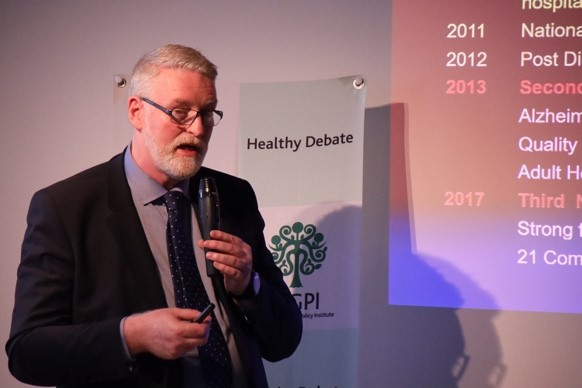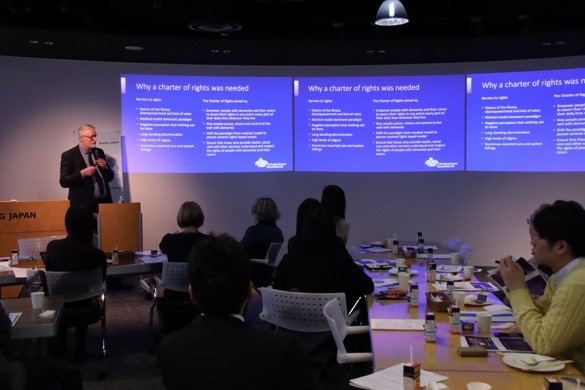[Event Report] The 75th Breakfast Meeting—”Learning from Scotland about Promoting Respect for Patients’ Rights and Building Communities Where People with Dementia Can Live with Hope” (February 15, 2019)
date : 3/28/2019
Tags: Dementia, HGPI Seminar
![[Event Report] The 75th Breakfast Meeting—”Learning from Scotland about Promoting Respect for Patients’ Rights and Building Communities Where People with Dementia Can Live with Hope” (February 15, 2019)](https://hgpi.org/en/wp-content/uploads/sites/2/bm-75-top.jpg)
In every country worldwide, led by Japan, longevity continues to drive the issue of population aging. Japan, alongside other countries, recognizes the need to establish community-based integrated care systems that enable older individuals to live with peace of mind in familiar environments. With similar needs also recognized in the field of dementia, Japan is promoting the creation of “dementia-friendly communities” across the country, hoping to help people with dementia to continue living in comfortable, familiar environments for as long as possible.
In terms of reorganizing the daily routines of individuals with dementia and their families, the period of time between the point of diagnosis and the point at which formal medical/long-term care services become fully necessary is considered particularly important. It is hoped that the presence of community connections, including opportunities for employment and social participation during this initial, post-diagnostic period, will enable individuals with dementia to continue serving as members of society and to contribute to the development of dementia-friendly environments.
Jim Pearson (see profile below), from Alzheimer’s Scotland, a global forerunner in the realization of dementia-friendly communities, introduced participants to his organization’s past achievements and future initiatives.
■ Personalized Dementia Support and Dementia Support Models
Alzheimer Scotland views flexible, personalized support tailored to the progression of the dementia as absolutely vital. The organization has formulated and put into practice three post-diagnostic support (PDS) models, staged in accordance with the progression of the disease—a “5 Pillar Model,” an “8 Pillar Model,” and an “Advanced Dementia Practice Model.”
Among these models, the “5 Pillar Model” is considered most appropriate for newly diagnosed individuals and their families, targeting individuals who, following diagnosis, do not yet require in-depth care. The goal of this model is to “enable the individual, following diagnosis, to continue living independently for as long as possible in their preferred environment.” The five pillars are as follows:
・Supporting community connections
・Peer support
・Planning for future care
・Understanding the illness and managing symptoms
・Planning for future decision-making
In this “5 Pillar Model,” in order to help people newly diagnosed with dementia and their families to avoid isolation, a “Link Worker” provides PDS, facilitating local community connections and playing the role of “partner” in planning for future care.
Scotland’s Third National Dementia Strategy, now underway, clearly states that PDS from a Link Worker is available free of charge for a minimum of one year, a period which can be extended if deemed necessary. That said, the number of Link Workers remains limited, and increasingly long waiting lists have become a concern.
Once an individual’s dementia has progressed to a moderate or advanced stage, more specialized support is then provided according to the “8 Pillar Model” or “Advanced Dementia Practice Model.”
■ The Importance of Listening to the Voices of Individuals
Listening to the voices of individuals with dementia is of particular importance in promoting the creation of dementia-friendly communities. Above all else, listening to the voices of individuals with dementia and their caregivers is the key to providing personalized, need-based support so that people with dementia can continue living independently in their communities.
It will also be vital to continue gathering these voices in collaboration with the members of the Scottish Dementia Working Groups active across Scotland and with multi-stakeholders from various communities.
Working toward community-level initiatives in every area of Scotland will enable the realization of person-centered policies and support services that elevate the voices of individuals.
■ Charter of Rights
The path to person-centered support as outlined by Alzheimer Scotland has not been reached without its share of challenges. Rather, it has been the result of multi-stakeholder discussions and collaboration. Of particular importance among Scotland’s dementia policies, the “Charter of Rights for Dementia” was approved by Parliament in 2009.
Barriers faced thus far in efforts to promote respect for patients’ rights include the following:
・A lack of patient empowerment and a failure to incorporate the voices of individuals due to the nature of the disease
・A paradigm characterized by the continued predominance of the medical model
・Persistence of negative stereotypes including the belief that “people with dementia can’t do anything”
・A long history of discrimination against people with dementia
・Failure of the status quo, in terms of care services and systems, to improve outcomes
In light of the current situation, goals of the Charter of Rights include the following:
・To ensure respect for the rights of people with dementia and their caregivers in every aspect of their daily lives and wherever they reside
・To provide empowerment and emphasize the rights of individuals to participate in various decisions so that they may live better with dementia
・To transition away from the predominance of the medical model and toward support models that are person-centered and based on the rights individuals
・To foster understanding and respect for the rights of people with dementia and their caregivers among people who provide health, welfare, and other services
The 2009 approval of this Charter of Rights has served as a major driving force behind the establishment of National Dementia Strategies since 2010.
■ Future Developments
Scotland’s National Dementia Strategy was initially launched in 2010, with the Second National Dementia Strategy established in 2013, and the Third National Dementia Strategy, in 2017. The current Strategy focuses on care for individuals with advanced dementia and their families, addressing issues such as palliative and end-of-life care. As in the past, alongside even further promotion of evidence-based strategies and clinical research, one policy pillar is the incorporation of voices from individuals with dementia and their communities. Alzheimer Scotland is currently engaged in policy-promoting activities, including participation in dementia research at the University of Edinburgh.
Photographed by:Kiyoshi Takahashi
■Profiles
Mr. Jim Pearson(Alzheimer Scotland’s Director of Policy & Research)
Jim is Alzheimer Scotland’s Director of Policy & Research. He leads the organisation’s public policy development, campaigning activities and engagement in dementia research. He is responsible for working with key stakeholders to ensure that the commitments of Scotland’s National Dementia Strategy are delivered at local and individual level. He also supports Alzheimer Scotland’s national and local involvement networks which ensure that people with dementia and carers have an effective voice to inform the work of Alzheimer Scotland and to influence dementia policy, practice and research nationally and locally. Jim is also a member of the Alzheimer Europe Board of Directors.


日本語
Top Research & Recommendations Posts
- [Report and Recommendations] Discussion Points in Healthcare DX Project Expert Panel Meeting (April 2, 2024)
- [Policy Recommendations] Kidney Disease Control Promotion Project 2023 “Establishing Kidney Disease Control Measures with Patient, Citizen, and Community Engagement and Collaboration” Policy Recommendations, a Collection of Good Practices of Chronic Kidney Disease (CKD) and Control Measures in Local Governments (February 14, 2024)
- [Announcement] A Significant Step Towards the Building a Green Healthcare System: Support for the Formal Expression of Interest by the Japanese Government Delegation to the ATACH at the Executive Board Meeting of the WHO (February 16, 2024)
- [Research Report] Survey of Japanese Physicians Regarding Climate Change and Health (December 3, 2023)
- [Policy Recommendations] Dementia Prevention Initiatives for Achieving a Dementia-Friendly and Inclusive Society (March 26, 2024)
- [Event Report] Planetary Health Expert Meeting Aiming for Sustainable Healthcare: Learning from the Impact of Environmental Pollution and Medical Waste During the Pandemic (February 16, 2024)
- [Research Report] 2019 Survey on Healthcare in Japan
- [Research Report] Building a Mental Health Program for Children and Measuring its Effectiveness (June 16, 2022)
- [Policy Recommendations] Three Necessary Perspectives for Formulating the Basic Plan for the Promotion of Policies on Dementia: Creating a Society That is Inclusive for All People at All Times (April 1, 2024)
- [Policy Recommendations] Establishing an integrated care system for pain from the perspectives of people with lived experience (March 29, 2024)
Featured Posts
-
2024-04-02
[Report and Recommendations] Discussion Points in Healthcare DX Project Expert Panel Meeting (April 2, 2024)
![[Report and Recommendations] Discussion Points in Healthcare DX Project Expert Panel Meeting (April 2, 2024)](https://hgpi.org/en/wp-content/uploads/sites/2/20240411.png)
-
2024-04-08
[Event Report] HGPI Participates in the Connecting Climate Minds Global Event (March 19-21, 2024)
![[Event Report] HGPI Participates in the Connecting Climate Minds Global Event (March 19-21, 2024)](https://hgpi.org/en/wp-content/uploads/sites/2/HGPI-Participates-in-the-Connecting-Climate-Minds-Global-Event_240319.png)
-
2024-04-08
[Registration Open] The 124th HGPI Seminar “Reconsidering Infectious Disease Control Strategies Centering on Vaccination and Immunization – From the Experiences of the COVID-19 Pandemic and a Life Course Approach” (April 26, 2024)
![[Registration Open] The 124th HGPI Seminar “Reconsidering Infectious Disease Control Strategies Centering on Vaccination and Immunization – From the Experiences of the COVID-19 Pandemic and a Life Course Approach” (April 26, 2024)](https://hgpi.org/en/wp-content/uploads/sites/2/HGPI_20240426_124thHGPISeminar_rev.png)
-
2024-04-10
[Research Report] “International comparison of dementia policies, research study on information dissemination.” (April 10, 2024)
![[Research Report] “International comparison of dementia policies, research study on information dissemination.” (April 10, 2024)](https://hgpi.org/en/wp-content/uploads/sites/2/dementia-20240410-top.png)
-
2024-04-11
[Research Paper] “Exploring the Potential of Industry-Academia-Civil Collaboration for Sustainability in the Healthcare Sector” Published in Journal Society for Environmental Economics and Policy Studies (March 31, 2024)
![[Research Paper] “Exploring the Potential of Industry-Academia-Civil Collaboration for Sustainability in the Healthcare Sector” Published in Journal Society for Environmental Economics and Policy Studies (March 31, 2024)](https://hgpi.org/en/wp-content/uploads/sites/2/ph-20240331-top.png)




